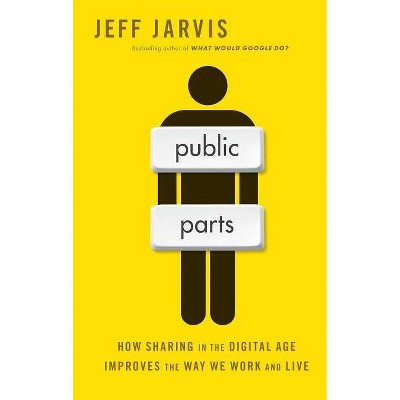Public Parts - by Jeff Jarvis (Paperback)

Similar Products
Products of same category from the store
AllProduct info
<p/><br></br><p><b> Book Synopsis </b></p></br></br>A visionary and optimistic thinker examines the tension between privacy and publicness that is transforming how we form communities, create identities, do business, and live our lives. <p/>Thanks to the internet, we now live--more and more--in public. More than 750 million people (and half of all Americans) use Facebook, where we share a billion times a day. The collective voice of Twitter echoes instantly 100 million times daily, from Tahrir Square to the Mall of America, on subjects that range from democratic reform to unfolding natural disasters to celebrity gossip. New tools let us share our photos, videos, purchases, knowledge, friendships, locations, and lives. <p/>Yet change brings fear, and many people--nostalgic for a more homogeneous mass culture and provoked by well-meaning advocates for privacy--despair that the internet and how we share there is making us dumber, crasser, distracted, and vulnerable to threats of all kinds. But not Jeff Jarvis. <p/>In this shibboleth-destroying book, <i>Public Parts </i>argues persuasively and personally that the internet and our new sense of publicness are, in fact, doing the opposite. Jarvis travels back in time to show the amazing parallels of fear and resistance that met the advent of other innovations such as the camera and the printing press. The internet, he argues, will change business, society, and life as profoundly as Gutenberg's invention, shifting power from old institutions to us all. <p/>Based on extensive interviews, <i>Public Parts </i>introduces us to the men and women building a new industry based on sharing. Some of them have become household names--Facebook's Mark Zuckerberg, Google's Eric Schmidt, and Twitter's Evan Williams. Others may soon be recognized as the industrialists, philosophers, and designers of our future. <p/>Jarvis explores the promising ways in which the internet and publicness allow us to collaborate, think, ways--how we manufacture and market, buy and sell, organize and govern, teach and learn. He also examines the necessity as well as the limits of privacy in an effort to understand and thus protect it. <p/>This new and open era has already profoundly disrupted economies, industries, laws, ethics, childhood, and many other facets of our daily lives. But the change has just begun. The shape of the future is not assured. The amazing new tools of publicness can be used to good ends and bad. The choices--and the responsibilities--lie with us. Jarvis makes an urgent case that the future of the internet--what one technologist calls "the eighth continent"--requires as much protection as the physical space we share, the air we breathe, and the rights we afford one another. It is a space of the public, for the public, and by the public. It needs protection and respect from all of us. As Secretary of State Hillary Clinton said in the wake of the uprisings in the Middle East, "If people around the world are going to come together every day online and have a safe and productive experience, we need a shared vision to guide us." Jeff Jarvis has that vision and will be that guide.<p/><br></br><p><b> Review Quotes </b></p></br></br><br>"A refreshing take on a topic often covered by people who feel that the Internet...threatens to imperil our children and undermine our society."--Jessi Hempel, Forbes.com<br><br>"How do we define what is public and what is private? What are the benefits and dangers of living a life in which everything is shared? Jarvis explores these questions and more in his immensely readable, chatty style... No one knows what's going to happen next. But people like Jarvis are having fun making sense of these confusing early years."--Niall Firth, "New Scientist"<P><br><br>"It's important and will become more so, and I'm very glad Jeff has written his valuable book."--Stephen Baker, author of "The Numerati"<br><br>"Jarvis makes a powerful case for re-framing the way we think about privacy, and for better appreciating the benefits of "publicness" in the information age."--Adam Thierer, Forbes.com<br><br>"Jarvis offers a persuasive and personal look at why sharing things publicly on the Web should become the norm... Jarvis works methodically in "Public Parts" to unravel long-held beliefs about why openness online is dangerous... Jarvis' message of openness will be provocative to many, but what he explores is only the beginning of a revolution that will continue to change how we use the Web--and how the Web uses us."--Mark W. Smith, "Detroit Free Press"<br><br>"The author of "What Would Google Do?" returns with another thoughtful look at the Internet age. A welcome and well-reasoned counterpoint to the arguments that social-networking sites and the easy availability of personal information online are undermining our society and putting our safety at risk... A must-read for anyone interested in the issue of connectivity versus privacy."--David Pitt, "Booklist"<br><br>"This is a superior work. Not only is it well researched and elegantly argued but he makes some original observations about how digital technology is changing the nature of human self-expression."--John Gapper, "The Financial Times"<br>
Price History
Price Archive shows prices from various stores, lets you see history and find the cheapest. There is no actual sale on the website. For all support, inquiry and suggestion messagescommunication@pricearchive.us




















